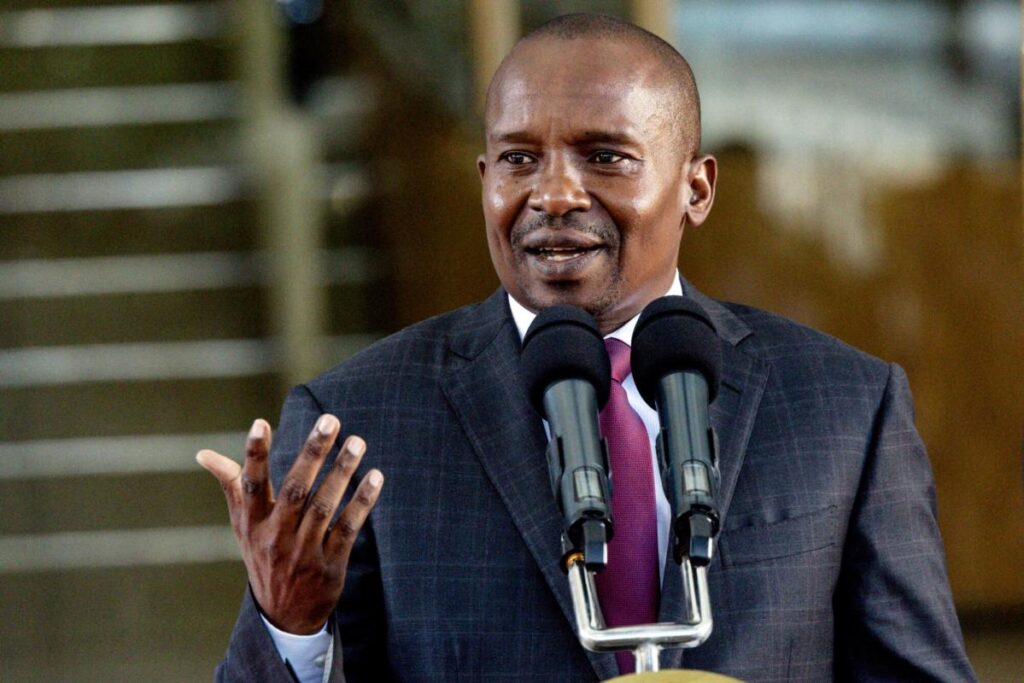In a strategic maneuver to solidify his administration’s influence, Kenyan President William Ruto has nominated Interior Secretary Kithure Kindiki as his new deputy president following the impeachment of Rigathi Gachagua. Kindiki, a law professor and senior government official, is set to take the reins of the vice presidency, should the National Assembly approve his appointment. This nomination comes at a crucial time, as Ruto seeks to strengthen his grip on power and restore confidence in his leadership amid mounting political turbulence and public discontent.
Gachagua’s impeachment stemmed from allegations of inciting ethnic hatred, a serious accusation that has implications for national unity. His removal from office reflects the current administration’s fragile state, as Ruto navigates a politically charged landscape marked by protests and civil unrest. Kindiki’s ascension to the vice presidency would not only fill a significant leadership vacuum but also position him as a vital liaison between the national government and Kenya’s 47 counties. As deputy president, Kindiki would take on a pivotal role in addressing the diverse needs and concerns of local governments, thereby potentially easing tensions and fostering stability.
This latest development is seen as part of Ruto’s broader strategy to restore legitimacy to his presidency following a series of anti-government protests earlier this year. These protests, driven by widespread dissent against proposed tax increases, resulted in tragic outcomes, claiming the lives of at least 60 individuals. The uprisings highlighted deep-seated frustrations among the populace regarding taxation and governance, further challenging Ruto’s administration to demonstrate responsiveness to citizens’ grievances. In this climate of unrest, Kindiki’s appointment may be viewed as a tactical effort to regain public trust and restore order.
Ruto’s administration has faced criticism for its handling of economic policies, particularly regarding taxation and public spending. The protests against tax hikes underscored a growing disconnect between the government and its constituents, prompting Ruto to seek measures to calm unrest and reassert his authority. By appointing Kindiki, who has a background in law and governance, Ruto could be signaling a commitment to more effective administration and the rule of law in addressing the complexities of the nation’s issues, including economic challenges and civic unrest.
Moreover, Kindiki’s extensive experience in the government positions him as a capable leader who may excel in fostering dialogue and collaboration between various levels of leadership in Kenya. As deputy president, he would chair a significant forum that connects county governance with the national administration. This role could be instrumental in implementing policies that reflect the needs of both urban and rural communities, thereby reducing regional disparities and promoting unity across the nation. His leadership could herald a new approach to governance that prioritizes inclusivity and responsiveness.
In summary, Ruto’s nomination of Kindiki represents a calculated step aimed at stabilizing his government during a period of notable political upheaval. By appointing a figure with governmental experience and legal acumen, Ruto aims to reinforce his administration’s legitimacy and curtail further unrest in the country. As the situation unfolds, Kindiki’s leadership will be crucial in navigating the intricacies of Kenyan politics, addressing public concerns, and fostering a more cohesive approach to governance that meets the diverse needs of the populace.

